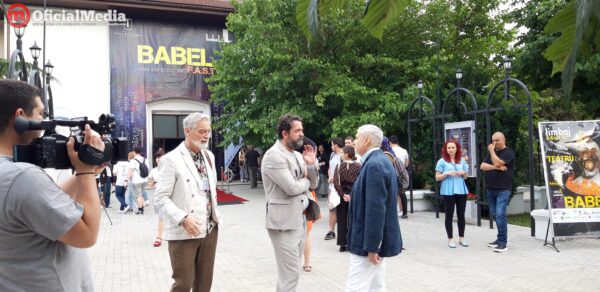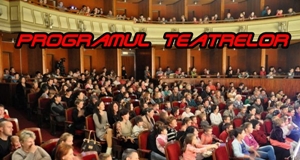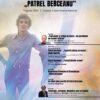Babel F.a.s.t – 10th edition of the Performing Arts Festival in Târgovişte, Romania (released by Kulturforum Europa)
The International Festival of Performing Arts in Târgoviște, BABEL was born out of a desire to regain the splendor that the city had for almost 300 years while it was the seat of government of the Romanian country and a political, economic and cultural landmark.
The biblical myth of the Tower of Babel signifies the human longing to see the wholeness of the universe, to attain the perfection of which man himself is a part. At the same time, Babel is the ground zero of diversity. The artistic and theatrical Babel is a specific way of touching the sky, not through the stone or metal constructions that make up the environment today, but through something more solid and that is soul community. Artistic expression is the language of the soul.
The connecting element of all artistic events is the theme of each edition, in 2022 it was „language”.
After two lost years of the pandemic, it filled me with joy and aroused curiosity about meeting lots of people and friends again, making new friends and finally breathing in a fresh breeze of music, film, book presentations, exhibitions and theater events.
Artists from different parts of Romania, Europe, Asia and India had gathered again to shed a colorful, cultural and entertaining light on the Tony Bulandra Theater and the city of Târgovişte.
„Meeting people, enjoying art together is what we missed, what we need and what we are celebrating at Babel X in this time of war and the pandemic,” said Dieter Topp, President of the Kulturforum Europa at the opening.

Oficial Media – Babel F.a.s.t – 10th edition of the Performing Arts Festival in Târgovişte, Romania (released by Kulturforum Europa)
Greek actress Despina Sarafeidou as „Kassandra” summed it up during her sizzling performance: reinventing the myth of the past to turn a hilarious reimagining of ancient Greek tragedy into a „stand-up tragedy” that confronts the reality of the present to look at it with a winking eye, to bring the past into the present where myth and present merge and remain alive in a very strange and also wonderful way, to look to the future, like Euripides and Bugs Bunny, Abba, Manchester United and Scarlett O’Hara being tragedy and humor. Maybe this could be the solution: „The world is rarely sunny, but we are Bugs Bunny!”
Director and stage, light and costume designer Romeo Castellucci contributed to the exciting start.
„The Third Reich” was an image of forced, obligatory communication, the violence of which corresponded to the claim to equal rights. Here a language machine emptied entire spheres of reality, as the nouns are all the same, mass-produced by machine, like prefabricated buildings in a knowledge that leaves no room for escape. All breaks were abolished, occupied. The pause or lack of words became a battlefield for the words and their military aggression. The dictionary nouns projected onto the screen were flags planted in a conquered land. The projection was preceded by a symbolic action in which a performer brought to life a ceremony in which language was ‘ignited’, accompanied by an apodictic sound by Scott Gibbons.
Here are a few more ideas on festival performances:
Evita Tango
An evening based on the life of the legendary Evita, wife of Argentine dictator Peron announced the Babel Festival program. But it was more than drama, movement, music and light.
Director MC Ranin, in collaboration with choreographer Hugo Wolff, had brought a docudrama to the stage of the Tony Bulandra Theater: original recordings from the 1930s up until her death gave the tone as contemporary witnesses. Young and exactly interpretive countertenor (Alexander Costea) opened, interrupted and ended the show with baroque songs of anticipation of death. The talented actress Mara Opris and her colleague Liviu Cheloiu accurately showed the rise and fall of the dictator and his lover in skilful tango poses.
Transferring it to the parallel events of G. Orwell’s Animal Farm gave this show a necessary universality in matters of dictatorship… And suddenly they were all on the stage, the dictator’s aides, the pigs, the secret police, the dogs,… and more and the viewer witnessed more and more how a system putsch into power through manipulation and false information. Now the life of Evita Peron was the hook for a statement that despises people to this day.
Ranin had once again embedded the whole show in Kabuki-like stage design he admired, with the tiniest of accessories and flowing colored light. Wolff has outdone himself this time, elevating the performers to the level of accomplished dancers. Impressive homage to a historical figure, skilfully embedded in a generally valid context.

Oficial Media – The International Festival of Performing Arts in Târgoviște, BABEL 2022 – released by Kulturforum Europa
New theater experience at the BABEL Festival.
Stage director Dumitru Acriş presented two of his latest creations, Dostoyevsky’s Crime and Punishment, with a delightfully well-trained and strong cast of the Tony Bulandra Theater, Târgovişte. „The House” after Gorky was presented by the National Theater Satiricus from Chisinau, Republic of Moldova, with an outstanding cast.
The audience sat on the stage and the actors played in some corridors in between. The spectators were, in a sense, witnesses of the play. They were caught in the middle of the story with no way to leave the venue or sneak out of the action.
A new experience for almost everyone involved, audience and actors. This form of spectacle resembled a „theater in raw format”. For some it was pure excitement, for others „sausage without skin”. It remains to be seen whether this form will endure or remain one possibility among many others.
Caglar Yigitogullari’s eagerly awaited solo performance „HeimatLost” more than lived up to expectations.
An actor who had lost his homeland went in search of new engagements. This failed and it tore the artist apart. No one could give him the support he needed, and the contacts with his parents became clichés in his life. He lived on the streets, his music disappeared into nowhere. It all ended in self-denial and excremental petrification.
In a shaman/punk performance, Caglar Yigitogullar showed a deep and very personal insight into the life and emotional world of an artist who can no longer perform in his beloved homeland (Turkey). Now he lives as a migrant in a pocket universe that creates its own structures in which he is trapped.
Carmelo Bene’s original amputation of Shakespeare’s Richard III.
There is always an attempt to see Shakespeare’s historical tragedies as the struggle for the crown of England, always emphasizing that all of these works begin with the struggle to seize power or secure a throne and all end with the death of the king.
So it came as a surprise when Richard III. after Carmelo Bene, staged by director Emmanuel Ray, Théâtre en Pièces, Chartres. The entire royal system was gone, the only surviving characters appearing to be Richard III. and the women. Furthermore, the play did not end with death, but on the contrary with the constitution of a character who became Richards III. Fascinating not only the interpretation, but also the play of the actors.
The International Association for Performing Arts and Research – IAPAR is a network of Indian artists and creators who seek to share ideas, enhance opportunities within the arts community and connect everyone within it. It promotes independence and openness to interdisciplinary thinking and acting. It functions as the Indian Center of the International Theater Institute. Founded in 2013, it has since initiated many projects and been part of many international festivals and networks.
„Is God a Taoist”, a dialogue between „a god” and „a mortal”, was the first of a trilogy.
DARWIN. Another tale by an Indian storyteller (Vidyanidhee Vanarase Prasad) described the journey of a young boy drawn to science by his intense interest in the diverse flora and fauna that surrounded him, a profound performance, a tale of science and evolution and about the unique ways they have transformed human life.
Fall Again, Fly Netter, followed as a solo performance written by Aditi Venkateshwaran, performed and directed by Vidyanidhee Vanarase. It was an exploratory tale of a dancer growing up with someone who has lost control of her body, an insight into the very personal life of Aditi Venkateshwaran, full of Indian flair and colour.
Theater „ID” SÎRBU” PETROȘANI, Romania „The Death of Ipu”
… A man wishes to see his own funeral to be attended by those who wait for him to die for them …
The performance, directed by Sorin Militaru, gave an insight into the deeply rooted Transylvanian way of life, thinking and feeling during World War II.
“Is one life worth more than another? Are six lives worth more than one? Do extreme situations justify human sacrifice? What can lie behind a man who sacrifices himself to save others?
Careful! All possible answers to these questions can be wrong as well as right. We must not rush judgment. And neither did this show. The viewer on the way home was free to make up an answer.
“Because beyond the story of a Transylvanian village occupied during the war, it is our story today, where fear breeds hypocrisy and pettiness, panic dehumanizes, power does what power normally does. A man wants to see his own funeral. To be visited by those waiting for him to die for them. And maybe now is the right time to laugh. Or to cry. But there is also a child, a child who wants to speak the truth, a voice that will judge us all if we don’t listen to it. Ipu’s death is Ipu’s life. And vice versa.” – so the playwright Daniel Oltean.
The president of the Korean Theater Association, GEO Jeungeii Son, and Mihai Constantin Ranin, director of the Tony Bulandra Theater, Târgoviște, Romania, agreed on a huge project. Cooperation and artistic exchange in various formats are on the agenda. It is primarily about large-scale networking.
The KulturForum Europa expressly welcomed this support-worthy project.
Source: Dieter Topp, President of the Kulturforum Europa, board member in Babel Festival, theater networking specialist, journalist – with many tanks























